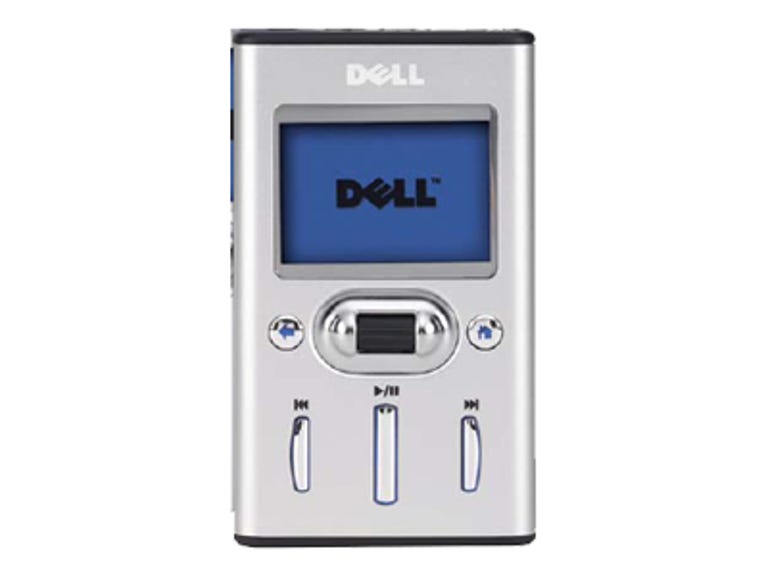 Why You Can Trust CNET
Why You Can Trust CNET Dell Pocket DJ (5GB) review: Dell Pocket DJ (5GB)
Dell Pocket DJ (5GB)
Dell's first micro hard drive-based MP3 player, the Pocket DJ, is exactly what you'd expect from the company. It looks virtually identical to the 20GB DJ, although much smaller and lighter, of course. It is designed to work with Microsoft Windows Media and MP3 formats. And at $200, the 5GB Pocket DJ undercuts the competition. True, it has neither the sex appeal of the iPod Mini nor the features of the Creative Zen Micro, but the Dell Pocket DJ is a solid, highly portable, easy-to-use MP3 player at a great price.
Editor's note: We have changed the rating in this review to reflect recent changes in our rating scale. Click here to find out more. Dell stuck to its old playbook for its first micro hard drive-based MP3 player. The Pocket DJ looks virtually identical to the regular DJ, right down to the anodized aluminum case, the scroll barrel in the center, and the blue backlighting on the display and buttons.
Micro hard drive-based players have become very popular, and it seems that manufacturers have at last temporarily reached a détente in terms of the size and weight of a device containing a 5GB drive. The Apple iPod Mini, as well as the latest models from Creative, Rio, Samsung, and Virgin, are all roughly the same size and weight.
The Good
The Bad
The Bottom Line

The same is true of the Dell Pocket DJ. It measures 3.5 by 2.1 by 0.5 inches and weighs 4.4 ounces. That is perhaps slightly larger and heavier than the iPod Mini, but no matter. The device is compact and light enough to take with you everywhere. (If you want something significantly smaller, you'll need a flash-based MP3 player instead.) In this class, buyers will be choosing based on other factors, including aesthetics, features, and performance.
Speaking of aesthetics, the Pocket DJ won't attract any oohs or ahhs, but it has a clean, sturdy, and efficient look that works equally well at home, in a dorm room, or at the office--just about anywhere. Dedicated volume buttons, the power button, the headphone jack, and a USB 2.0 port line the unit's top side while a Hold switch resides on the back. The USB port serves as both the data transfer and power connection.
For this second generation of DJs, Dell has refined the interface. The top-level menus on the 1.6-inch-diagonal LCD now include Music Library, Now Playing, Play Mode, Date & Time, Settings, and Info. Overall, it reminds us of the interface on Creative's nonflash MP3 players--and that's a good thing.
We were disappointed that neither the Pocket DJ nor the new DJ currently support Microsoft's latest digital rights management (DRM) features out of the box even though the new features were available within Windows Media Player 10.0 before the new DJ models arrived. Dell says it will provide a free downloadable flash upgrade in early February to support WMP 10.0 DRM (previously known as Janus), but that is extra work for users and is likely to cause some confusion. The primary reason to get the update with the new DRM is to be able to use your MP3 player take advantage of the entire catalog of subscription content from services such as Napster.
The Pocket DJ has all the basics. The 5GB drive is sufficient to hold 1,200 CD-quality MP3s, according to Dell's calculations. It works well with the Dell-branded version of Musicmatch Jukebox 9.0 that is included--even though version 10.0 has been out for some time--but if you prefer, you can also use it with Windows Media Player 10.0. You can quickly sync basic info--song title, artist, album, genre, and playlists--between the device and software either manually or automatically using USB 2.0. You can play music in standard or shuffle modes, and the Pocket DJ has an equalizer with eight presets and a custom setting.
That's basically it. You won't find any bells and whistles on the Pocket DJ. It doesn't come in different colors, and there is no FM tuner, no line-in recording, no color LCD to display album art, no playlists on the go, no PIM features (although there is a calendar), and so on. These are features found on many competing products such as the Creative Zen Micro. Then again, the Dell Pocket DJ costs less than most competing MP3 players.
The Pocket DJ's rechargeable lithium-polymer battery is rated for 10 hours of battery life, and that is basically what we got. To be more precise, the 9.5 hours it scored in CNET Labs' tests put it in between the Apple iPod Mini (8 hours) and longer-lasting products such as the Creative Zen Micro and, most notably, the 20-hour Rio Carbon.
The sound quality was fine, with a signal-to-noise ratio of 95dB (the higher the signal-to-noise ratio, the cleaner the sound). Generally speaking, any device at 95dB or above is pretty good, though some MP3 players definitely do better; the Zen Micro, for example, has a ratio of 98dB. Consumers can utilize any of the eight preset EQ settings or a four-band, user-defined EQ to fine-tune their audio. As with most MP3 players, the included earbuds are uncomfortable and don't sound particularly great, so we recommend that you invest in a good pair of 'phones.
On our tests, the Pocket DJ transferred a music library at a rate of 2.7MB per second over its USB 2.0 connection. That's a solid score--right about where it should be.
